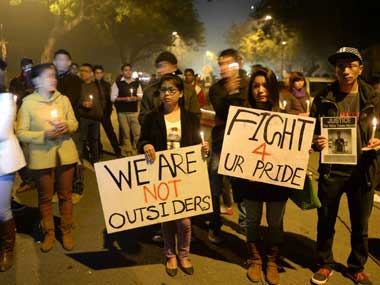Do you eat momos for breakfast, lunch and dinner? Are your grandparents from China? How come your parents allow you to wear such clothes? Your food smells! Dude, close the tiffin box! Is your village in a jungle? You are all tribals, right? Does your brother wear skirts to weddings and other celebrations? That’s how we stereotype our own people and that’s how we are going to isolate and tear apart our nation. One of the authors of this post, Chum Darang, faced unwanted incidents of discrimination directed against her in Mumbai. She faced difficulties, and with great courage, protested in Mumbai. Her Instagram post on the issue went viral, but was still only covered by the North East media. Her harassers in Mumbai won’t get to know about her side of the story at all.
India is a country which has always been seen as a melting pot of various religions, traditions and ethnicities. We pride ourselves on the fact that we have a pluralistic culture, which has evolved and matured over several millennia. Our nation survived attempts by the colonial forces to disintegrate and divide us, so why are we not trying hard enough to hold it together now? Why do we not see diversity as our USP? The fact that you can find momos, samosas and idlis in the same kitchen is a matter of great joy. We have always celebrated differences; let’s not do this any other way.
[caption id=“attachment_4500829” align=“alignleft” width=“380”]  Representational image. AFP[/caption]
We have written this article to express our worries and concerns over the way we are discriminating against citizens from the North East. Incidents of violence and abuse related to racial discrimination have been surfacing from most major cities in the country.
Students and professionals from the North East have been harassed, abused and even murdered, simply because they were “different”. We have been quick to label people and form judgements; if we see a young boy from the North East with a distinct hairstyle and sporting tattoos, we assume that he is either a “junkie”, an alcoholic or a drug peddler.
Nido Tania was just another 20-year-old boy having fun in a Delhi market with his friends when he was mocked for his “funny” hairstyle. And just like any other normal teenager, he retorted. However, what ensued after was not normal and Nido lost his life.
Impact Shorts
More ShortsYes, the colour of his skin was of a different shade; yes, he had Mongolian features; and yes, his food habits and dressing choices were different, but all that should not have made him any less worthy of respect and appreciation.
It was in response to this and other such incidents that the Bezbaruah Committee was set up. The committee came up with useful directives to address the growing menace of discrimination. However, putting these directives into action is our responsibility.
We need to start by sensitising ourselves towards the needs and concerns of the northeastern community. It has been highlighted in a number of reports that migrants from the North East avoid interacting with the police simply because they feel unsafe around them. This is bizarre. If those who are tasked to protect us do not inspire confidence, then we are clearly doing something wrong. We therefore need civil society groups to conduct awareness and sensitisation workshops for police officers and constables. Sensitising the law enforcement agencies has to be the first step in addressing the problem.
Bodies such as NCERT can also help sensitise the other stakeholders in society towards the northeastern community. NCERT can add a chapter on the history and culture of the North East in school curriculum, so that students are familiar with the unique culture of the region from a young age. Universities and colleges can also run short orientation sessions designed especially for students from the North East who are new to the city.
A cultural forum can be set up in collaboration with educational institutions and student associations. The main objective of such a forum will be to conduct cultural festivals showcasing different North East traditions, cultures, handicrafts etc.
The government should initiate and fund mechanisms to organise awareness campaigns on rights. Most surveys have found little understanding of the legal system and low awareness of important legislation such as the Prevention of Atrocities Against Scheduled Castes and Scheduled Tribes Act. If citizens don’t know how to exercise their rights, there is only so much that the legal system do to ensure justice.
Support can also be offered by running campaigns through social media channels such as Facebook and WhatsApp. These channels can play a big role in cultivating a community spirit and offering support and advice in times of need.
This will not only help them adjust better and faster, but people would also know whom to reach out to in case they need help and support. By taking these small but proactive steps, governments and educational institutions can fulfil their promise of creating a just and equitable society, where diversity is not only embraced but also celebrated.
For, it is not only the victimised community that suffers alone; each of us who fail to stop this injustice, lose a bit of humanity.
The authors are a member of Parliament for Arunachal East; a former Miss India; and a policy analyst, respectively


)

)
)
)
)
)
)
)
)



